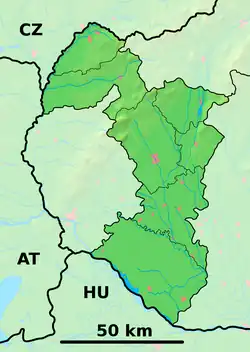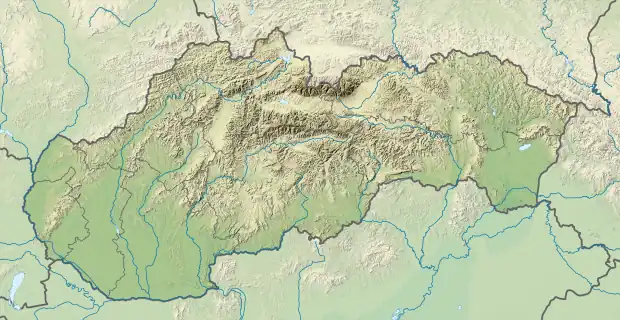Šintava | |
|---|---|
Municipality | |
 Coat of arms | |
 Šintava Location of Šintava in the Trnava Region  Šintava Šintava (Slovakia) | |
| Coordinates: 48°17′N 17°46′E / 48.283°N 17.767°E | |
| Country | Slovakia |
| Region | Trnava |
| District | Galanta |
| First mentioned | 1074 |
| Area | |
| • Total | 11.565 km2 (4.465 sq mi) |
| Elevation | 139 m (456 ft) |
| Population | |
| • Total | 1,719 |
| • Density | 150/km2 (380/sq mi) |
| Time zone | UTC+1 (CET) |
| • Summer (DST) | UTC+2 (CEST) |
| Postal code | 925 51 |
| Area code | 421-31 |
| Car plate | GA |
| Website | www.sintava.sk |
Šintava (Hungarian: Sempte) is a village and municipality in Galanta District of the Trnava Region of south-west Slovakia.
History

In historical records the village is first mentioned in 1042, when King Peter, the successor of Stephen I of Hungary, having been deposed from his throne united with German emperor Henry III to gain back his country. They launched campaign against King Samuel Aba who, in 1041, had been elected king by the aristocrats who had toppled King Peter. Peter and Henry conquered Pozsony (now: Bratislava) and the whole area of the river Vah, castles Šintava, Galgóc (now: Hlohovec), Bana and they reached up to river Hron.
A second written historical report comes from Vienna picture chronicle in 1074, mentioning Šintava castle as the place where overthrown King Salomon of Hungary, son of King Andrew, was given assistance by Emperor Henry IV of Germany. They fought for Salomon to regain his throne, which had been occupied by King Géza, who had his residence in Nitra. The chronicle shows: "And when the emperor came to the river Vah, Solomon rode on horseback with three formations from Šintava towards Nitra". The settlement had Hungarian majority in the 17th century according to the Turkish tax census.[1]
Geography
The municipality lies at an elevation of 139 metres and covers an area of 11.565 km². It has a population of about 1719 people.
External links
 Media related to Šintava at Wikimedia Commons
Media related to Šintava at Wikimedia Commons- Official page
- http://www.statistics.sk/mosmis/eng/run.html
- ↑ Károly Kocsis, Eszter Kocsisné Hodosi, Ethnic Geography of the Hungarian Minorities in the Carpathian Basin, Simon Publications LLC, 1998, p. 46